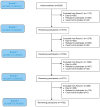Longitudinal association between diabetes and cognitive decline: The National Health and Aging Trends Study
- PMID: 28544945
- PMCID: PMC5967846
- DOI: 10.1016/j.archger.2017.05.005
Longitudinal association between diabetes and cognitive decline: The National Health and Aging Trends Study
Abstract
Type II diabetes mellitus (DM) is associated with increased risk of dementia; however, few studies have examined the longitudinal association between DM and cognitive outcomes in large nationally representative cohorts. We investigated these associations in 7605 participants enrolled in the National Health and Aging Trends Study, a nationally representative prospective study of Medicare beneficiaries ≥65, from 2011 to 2015. Participants or proxy respondents reported DM and dementia diagnosis, and participants completed immediate and delayed recall word list learning tests and the Clock Drawing Test. In multivariable-adjusted generalized linear mixed models, baseline DM diagnosis was associated with decline on immediate and delayed word recall and the Clock Drawing Test. In Cox proportional hazards models, DM also predicted incident dementia in older age groups at baseline. These findings further support the notion that DM is associated with cognitive outcomes, suggesting that treatment and prevention of DM may reduce the risk of these outcomes. However, more studies are needed to better understand whether DM treatments affect this relationship.
Keywords: Cognitive decline; Dementia; Diabetes; Epidemiology.
Copyright © 2017 Elsevier B.V. All rights reserved.
References
-
- Alzheimer’s Association. 2014 Alzheimer’s disease facts and figures. Alzheimer’s & Dementia. 2014;10(2) - PubMed
-
- American Diabetes Association. Diabetes Basics: Diabetes Statistics. 2013 Aug 20; Retrieved from http://www.diabetes.org/diabetes-basics/diabetes-statistics/
-
- Awad N, Gagnon M, Messier C. The relationship between impaired glucose tolerance, type 2 diabetes, and cognitive function. Journal of Clinical and Experimental Neuropsychology. 2004;26(8):1044–1080. http://dx.doi.org/10.1080/13803390490514875. - DOI - PubMed
-
- Barnes DE, Yaffe K. The projected effect of risk factor reduction on Alzheimer’s disease prevalence. The Lancet Neurology. 2011;10(9):819–828. http://dx.doi.org/10.1016/s1474-4422(11)70072-2. - DOI - PMC - PubMed
-
- Benedict C, Brooks SJ, Kullberg J, Burgos J, Kempton MJ, Nordenskjold R, … Schioth HB. Impaired insulin sensitivity as indexed by the HOMA score is associated with deficits in verbal fluency and temporal lobe gray matter volume in the elderly. Diabetes Care. 2012;35(3):488–494. http://dx.doi.org/10.2337/dc11-2075. - DOI - PMC - PubMed
MeSH terms
Grants and funding
LinkOut - more resources
Full Text Sources
Other Literature Sources
Medical


